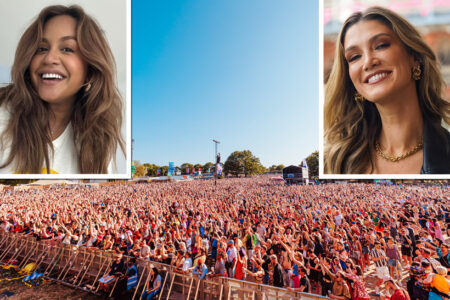A slim majority of respondents to a Sydney Gay and Lesbian Mardi Gras survey believe that the NSW Police Force should not be allowed to march in the annual Mardi Gras parade, reflecting ongoing tension between parts of the LGBTQIA+ community and law enforcement.
The survey’s findings, however, come with significant limitations due to the low participation rate, with just 96 of Mardi Gras’ 3505 members (2.7 per cent) responding, along with 55 non-members, bringing the total number of respondents to 151.

Following the release of the survey’s results on Monday, Mardi Gras announced that it would present a motion at its upcoming annual general meeting (AGM) in December, allowing members to vote on whether to continue permitting the police to march in the parade.
The proposed motion reads: “This AGM moves that the NSW Police Force not be able to march in the parade until such time as they demonstrate a commitment to improving relationships with LGBTQIA+ communities.”
Mardi Gras clarified that while the motion reflects feedback gathered from community consultations and the survey, it does not represent the board’s stance on the matter.
The board will not take a position and has instead encouraged members to make an informed decision at the AGM based on the findings of the consultation report and discussions at the meeting.
The survey was conducted in response to heated debate surrounding police participation following the 2024 Mardi Gras festival. In the lead-up to that event, police were initially banned from marching after the alleged murders of gay couple Jesse Baird and Luke Davies by a serving NSW police officer.
Although the ban was later overturned, it was decided that officers would not march in uniform, a compromise aimed at addressing concerns while allowing LGBTQIA+ police members to participate.
Despite this compromise, the issue of police involvement in Mardi Gras remains deeply divisive.
Of the 151 people who responded to the survey, 54 per cent said police should not be allowed to march, while 46 per cent supported their inclusion.
The survey also formed part of a broader consultation process, including a series of in-person and online sessions, which saw 157 participants.
The report summarising these consultations was publicly released on Monday. Cath Glasson-Ashburn, the author of the report, noted the “strong, contrasting views” that emerged during the consultations.
“Many assert that the historical and ongoing harm caused by police towards marginalised communities, particularly when in uniform, makes their inclusion in Mardi Gras inappropriate,” she wrote. “On the other hand, some see the participation of LGBTQIA+ officers as a symbol of progress and reconciliation.”
The issue touches on longstanding concerns about police mistreatment of marginalised groups within the LGBTQIA+ community.
Mardi Gras, which began as a protest against police brutality in 1978, has long held a complicated relationship with law enforcement. For many community members, police presence in the parade is seen as contradictory to its activist origins, particularly for those who have experienced trauma or mistreatment by law enforcement.
Luc Velez, a board member of Mardi Gras and a spokesperson for the activist group Pride in Protest, said the survey results and consultations made it clear that the community did not want police in the parade.
“The community town halls heard story after story about how queer people feel unsafe around police,” Velez said.
“People spoke about police using slurs, of them not taking sexual assault victim-survivors seriously because they were queer, and of police deliberately misgendering and deadnaming people in custody.”
Velez argued that allowing police to participate in Mardi Gras has had the opposite effect of inclusion, alienating many marginalised groups.
“Mardi Gras strives to be an inclusive space but allowing police in has led to the exclusion of countless victims of police violence, people impacted by Blak deaths in custody, and many sex workers, activists, people who use drugs, and queer and trans people.
“This year must be the year Mardi Gras chooses to prioritise the inclusion of victims of police violence, over the institution responsible for ongoing harm to our community.”
Glasson-Ashburn’s report also highlighted the core tension between two competing visions of Mardi Gras: one that views the parade as a celebration of LGBTQIA+ identity, progress, and inclusion, and another that sees it as an activist platform for resisting systemic oppression.
“The core tension lies between honouring the parade’s activist roots and the belief that it should be [a] broader celebration of inclusion,” the report stated.
The consultation report indicated that many participants felt the police’s presence in the parade was harmful, particularly for those who have experienced violence or harassment at the hands of law enforcement.
“They believe police presence alienates vulnerable community members and serves as a public relations tool without addressing systemic issues,” the report said.
However, not everyone within the community shares this view. Some participants in the consultations argued that the inclusion of LGBTQIA+ police officers represents a sign of progress.
They believe it can foster safety and unity between law enforcement and the LGBTQIA+ community.
Glasson-Ashburn noted that many who supported police involvement saw it as a step toward reconciliation and cultural change within law enforcement, particularly when LGBTQIA+ officers are visibly participating in the event.
The survey results and community feedback set the stage for what is expected to be a contentious AGM in December.
With only a small fraction of Mardi Gras’ members responding to the survey, the vote on police participation may draw even more engagement, as the community grapples with the complex legacy of Mardi Gras and its evolving role in the fight for LGBTQIA+ rights.
Editor’s note: Journalists Eliot Hastie and Ben Grubb pay a $50 annual Mardi Gras membership for discount purposes only. They don’t vote in the AGM.





1 Comment
Emphasis on the small sample size. It was also packed with activists and dubious uncorroborated stories of supposed harassment without the police there to give their side. Many activists attended multiple sessions to bias results and try to force their way. In the Zoom white board sessions they jumped all over the screen with huge text to drown out others and had to be asked not to do it. Very disrespectful.